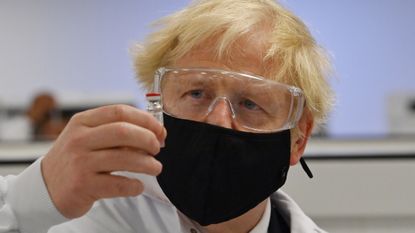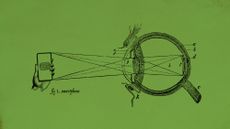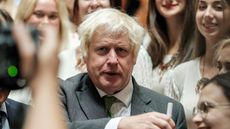Why has the Oxford-AstraZeneca vaccine faced so much scrutiny?
European safety concerns over vaccine remain despite positive data from UK campaign

Even the most ardent supporter of the government would struggle to deny that the UK’s pandemic response has had its fair share of low points. But in one regard the country has streaked ahead of its neighbours: vaccinations.
The Oxford-AstraZeneca vaccine is the jewel in the crown of the jab rollout that has so far seen over 24 million people receive at least one dose, with plans in place to ramp up to five million jabs every seven days in the coming weeks.
But despite the positive data emerging from the UK, the Oxford University-developed jab has repeatedly faced criticism and suspicion from European nations.
Subscribe to The Week
Escape your echo chamber. Get the facts behind the news, plus analysis from multiple perspectives.

Sign up for The Week's Free Newsletters
From our morning news briefing to a weekly Good News Newsletter, get the best of The Week delivered directly to your inbox.
From our morning news briefing to a weekly Good News Newsletter, get the best of The Week delivered directly to your inbox.
Damaged goods?
A string of European countries, including France and Germany, have suspended the use of the Oxford-AstraZeneca vaccine amid unproven fears the vaccine could trigger blood clots.
The suspensions of the jab came despite both the UK’s regulator and the European Medicines Agency (EMA) saying “that there is no indication that vaccination is linked to thromboembolic events”, the BMJ reports.
Italy, Spain, Germany, France and Cyprus also announced a suspension in the past few days, after Denmark became the first country to halt its use of the vaccine when a 60-year-old woman developed a blood clot and died. Austria, Estonia, Lithuania, Luxembourg, Latvia, Bulgaria, Romania, Iceland, Norway, Sweden, the Netherlands and the Republic of Ireland have also all suspended its use.
BBC health correspondent Nick Triggle writes that “from what has been published so far the chance of a blood clot after vaccination is very low”, adding that “it could be in line with what you would expect to happen anyway – coincidence rather than cause”.
But this is not the first time that European confidence in the Oxford vaccine has been damaged, after Emmanuel Macron claimed in January, on the day the EMA approved the vaccine for use in all age groups in the EU, that it was “almost ineffective” in over-65s.
Days before, German media had also made misleading claims over its efficacy, claiming the AstraZeneca vaccine “had an effectiveness of only 8%” in that age group and attributing the figure to a source in the German health ministry.
Writing on Twitter, The Times’ Berlin correspondent Oliver Moody notes that AstraZeneca’s “strange interim phase three clinical trial data sent it into a bit of a vicious PR circle” in Germany.
In the early clinical trials, “scientists decided not to test the vaccine among large groups of over-65s, until they had plenty of evidence that it was safe in younger people”, the Financial Times reports.
Despite the rollout reducing deaths and hospitalisations in the UK, that “lack of data” was what “led to many European countries advising against its use on older people”, damaging public opinion of the vaccine’s efficacy, the paper adds.
The shortage of data also meant “regulators & vaccine panels have been watching the AZ data like hawks”, The Times’ Moody says. A dispute between the EU and the pharmaceutical giant over “production, distribution and the details of the contract have only made relations worse”, he adds.
Belgium has stood firm on its decision to continue using the Oxford jab, with its most senior virologist, Marc Van Ranst, tweeting that “the side effects of stopping AstraZeneca vaccination are Covid-19 hospitalisations, long-term organ damage from Covid-19, and death from Covid-19”.
But whether other European countries will resume using the jab, and whether they can rebuild public trust, remains to be seen.
Blame game?
“While governments are pulling the plug, most scientists are rolling their eyes”, The Guardian says. “Blood clots are common, but not more common in people who have had a Covid jab, from the evidence so far”.
However, there are also suspicions that “the vaccine is being put on hold for political, rather than scientific, reasons,” Forbes reports.
Citing a report by Barclays looking into AstraZeneca’s regulatory issues in Europe, it suggests that “authorities in certain geographies may have been looking for someone to blame for an initially frustrating rollout”.
Last week, the “fraught” relationship between the EU and UK was further “inflamed” when European Council President Charles Michel accused the UK of imposing an “outright ban” on the export of vaccines, BBC Europe editor Katya Adler reports.
Both Boris Johnson and Foreign Secretary Dominic Raab strenuously denied the accusation. But the prime minister has also not shied away from politicising the UK’s successful vaccine rollout.
Prior to February’s G7 meeting, pundits suggested that Johnson had taken a sly dig at the EU when he urged the bloc to pool its “collective ingenuity” to develop new vaccines to tackle new coronavirus strains. And writing in The Times today, Johnson has moved to position the UK as a leading light in the fight against coronavirus, saying the UK’s vaccination programme has inspired a “new global hope”.
Create an account with the same email registered to your subscription to unlock access.
Sign up for Today's Best Articles in your inbox
A free daily email with the biggest news stories of the day – and the best features from TheWeek.com
Sorcha Bradley is a writer at The Week and a regular on “The Week Unwrapped” podcast. She worked at The Week magazine for a year and a half before taking up her current role with the digital team, where she mostly covers UK current affairs and politics. Before joining The Week, Sorcha worked at slow-news start-up Tortoise Media. She has also written for Sky News, The Sunday Times, the London Evening Standard and Grazia magazine, among other publications. She has a master’s in newspaper journalism from City, University of London, where she specialised in political journalism.
-
 Nigeria's worsening rate of maternal mortality
Nigeria's worsening rate of maternal mortalityUnder the radar Economic crisis is making hospitals unaffordable, with women increasingly not receiving the care they need
By Harriet Marsden, The Week UK Published
-
 'Elevating Earth Day into a national holiday is not radical — it's practical'
'Elevating Earth Day into a national holiday is not radical — it's practical'Instant Opinion Opinion, comment and editorials of the day
By Harold Maass, The Week US Published
-
 UAW scores historic win in South at VW plant
UAW scores historic win in South at VW plantSpeed Read Volkswagen workers in Tennessee have voted to join the United Auto Workers union
By Peter Weber, The Week US Published
-
 Covid four years on: have we got over the pandemic?
Covid four years on: have we got over the pandemic?Today's Big Question Brits suffering from both lockdown nostalgia and collective trauma that refuses to go away
By Chas Newkey-Burden, The Week UK Published
-
 How happy is Finland really?
How happy is Finland really?Today's Big Question Nordic nation tops global happiness survey for seventh year in a row with 'focus on contentment over joy'
By Harriet Marsden, The Week UK Published
-
 The hollow classroom
The hollow classroomOpinion Remote school let kids down. It will take much more than extra tutoring for kids to recover.
By Mark Gimein Published
-
 Excess screen time is making children only see what is in front of them
Excess screen time is making children only see what is in front of themUnder the radar The future is looking blurry. And very nearsighted.
By Devika Rao, The Week US Published
-
 Covid-19: what to know about UK's new Juno and Pirola variants
Covid-19: what to know about UK's new Juno and Pirola variantsin depth Rapidly spreading new JN.1 strain is 'yet another reminder that the pandemic is far from over'
By Arion McNicoll, The Week UK Published
-
 Does declining birth rate spell doom for Britain?
Does declining birth rate spell doom for Britain?Today's Big Question Ageing population puts pressure on welfare state, economy and fabric of society, while fertility is rising on populist agendas
By Harriet Marsden, The Week UK Published
-
 Long-term respiratory illness is here to stay
Long-term respiratory illness is here to stayThe Explainer Covid is not the only disease with a long version
By Devika Rao, The Week US Published
-
 Covid inquiry: the most important questions for Boris Johnson
Covid inquiry: the most important questions for Boris JohnsonTalking Point Former PM has faced weeks of heavy criticism from former colleagues at the public hearing
By The Week Staff Published